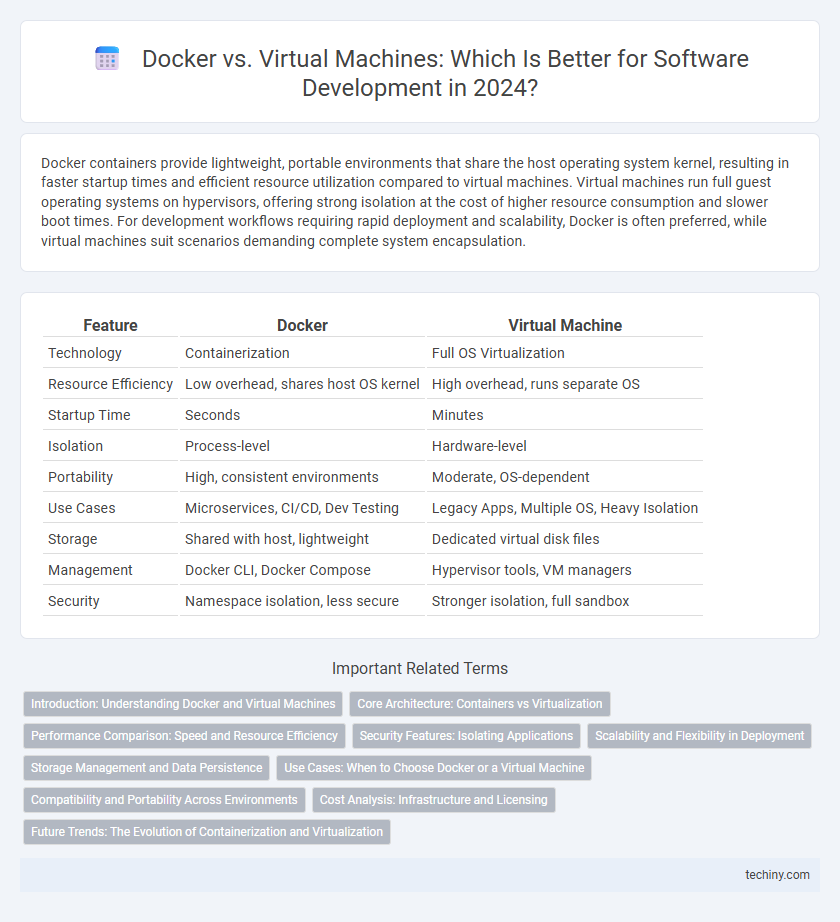Docker containers provide lightweight, portable environments that share the host operating system kernel, resulting in faster startup times and efficient resource utilization compared to virtual machines. Virtual machines run full guest operating systems on hypervisors, offering strong isolation at the cost of higher resource consumption and slower boot times. For development workflows requiring rapid deployment and scalability, Docker is often preferred, while virtual machines suit scenarios demanding complete system encapsulation.
Table of Comparison
| Feature | Docker | Virtual Machine |
|---|---|---|
| Technology | Containerization | Full OS Virtualization |
| Resource Efficiency | Low overhead, shares host OS kernel | High overhead, runs separate OS |
| Startup Time | Seconds | Minutes |
| Isolation | Process-level | Hardware-level |
| Portability | High, consistent environments | Moderate, OS-dependent |
| Use Cases | Microservices, CI/CD, Dev Testing | Legacy Apps, Multiple OS, Heavy Isolation |
| Storage | Shared with host, lightweight | Dedicated virtual disk files |
| Management | Docker CLI, Docker Compose | Hypervisor tools, VM managers |
| Security | Namespace isolation, less secure | Stronger isolation, full sandbox |
Introduction: Understanding Docker and Virtual Machines
Docker is a containerization platform that enables developers to package applications and their dependencies into lightweight, portable containers, ensuring consistent environments across different stages of development. Virtual machines (VMs) emulate entire operating systems on a host machine using hypervisors, providing isolated environments but with higher resource consumption compared to containers. Understanding the fundamental differences between Docker containers and VMs is essential for optimizing software deployment, scalability, and resource management in modern development workflows.
Core Architecture: Containers vs Virtualization
Docker uses containerization, which packages applications and their dependencies into lightweight, isolated units sharing the host operating system kernel, enabling faster startup and efficient resource utilization. Virtual machines rely on hardware-level virtualization, running full guest operating systems on a hypervisor layer, resulting in higher resource overhead and longer boot times. Containers deliver consistent environments with minimal resource consumption, while virtual machines provide stronger isolation at the cost of increased system resource usage.
Performance Comparison: Speed and Resource Efficiency
Docker containers deliver superior performance compared to virtual machines by utilizing shared operating system kernels, resulting in faster startup times often within seconds and significantly lower CPU and memory overhead. Virtual machines require full OS boot processes and allocate dedicated resources, leading to slower launch speeds and higher resource consumption. Consequently, Docker's lightweight architecture enhances scalability and efficiency, making it ideal for rapid development and deployment cycles.
Security Features: Isolating Applications
Docker uses containerization technology to isolate applications by sharing the host OS kernel while maintaining separate user spaces, which reduces overhead and enhances efficiency compared to Virtual Machines (VMs). VMs provide stronger isolation by virtualizing entire hardware environments, offering separate OS instances that create more robust security boundaries against potential breaches. While Docker containers deliver faster deployment and resource utilization, VMs offer superior isolation and protection critical for high-security applications in software development.
Scalability and Flexibility in Deployment
Docker offers superior scalability by enabling lightweight containerization, allowing rapid spin-up of multiple instances without the overhead of full operating system virtualization. Virtual machines require more resources and slower deployment times due to the need to replicate entire OS environments, limiting flexibility in dynamic scaling scenarios. Containers facilitate consistent environments across development, testing, and production, enhancing flexible deployment strategies in microservices architectures.
Storage Management and Data Persistence
Docker utilizes container-level storage that shares the host OS kernel, enabling lightweight and efficient data persistence through volumes and bind mounts, which offer seamless integration with local filesystems. Virtual Machines (VMs) use virtualized block storage that operates independently of the host, often requiring complex snapshot and backup mechanisms for persistent data management. Docker's layered filesystem allows faster storage allocation and rollback compared to traditional VM disk images, optimizing storage utilization and data portability in development environments.
Use Cases: When to Choose Docker or a Virtual Machine
Docker excels in microservices and continuous integration/continuous deployment (CI/CD) pipelines by enabling lightweight, fast, and consistent containerized environments. Virtual machines are better suited for running multiple different operating systems on a single physical host, supporting legacy applications requiring full OS virtualization with enhanced isolation and security. Developers choosing between Docker and virtual machines prioritize Docker for application portability and resource efficiency, while virtual machines remain ideal for complex, multi-OS setups and scenarios demanding stringent security boundaries.
Compatibility and Portability Across Environments
Docker containers encapsulate applications with their dependencies, ensuring consistent compatibility across various environments including development, testing, and production. Unlike virtual machines that virtualize entire operating systems, Docker's lightweight containerization offers superior portability and faster deployment without the need for a full OS installation. This approach minimizes environment-specific issues by standardizing software behavior regardless of host OS differences, enhancing cross-platform consistency.
Cost Analysis: Infrastructure and Licensing
Docker containers dramatically reduce infrastructure costs by sharing the host OS kernel, enabling higher density deployment on the same hardware compared to Virtual Machines, which require full OS instances and more resources. Licensing expenses are lower with Docker as it often leverages open-source platforms and avoids the need for multiple OS licenses required in VMs. Enterprises see cost efficiency in scaling applications using Docker due to reduced compute, storage requirements, and simplified licensing models.
Future Trends: The Evolution of Containerization and Virtualization
Future trends in software development indicate a growing preference for containerization over traditional virtual machines due to Docker's lightweight architecture and faster deployment capabilities. Emerging technologies such as Kubernetes orchestration and serverless computing are enhancing container scalability, automation, and resource efficiency. Hybrid environments combining containers and virtual machines are anticipated to optimize workload flexibility and security in enterprise applications.
Docker vs Virtual Machine Infographic

 techiny.com
techiny.com